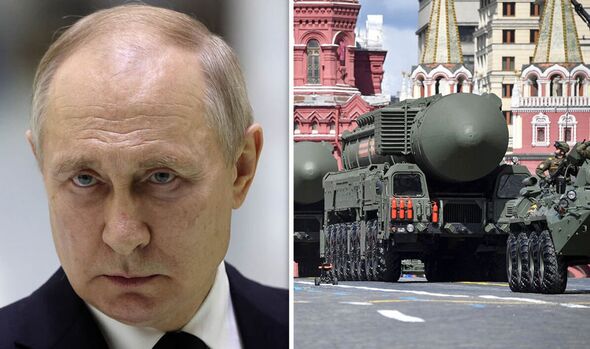Vladimir Putin using nuclear weapons “cannot be ruled out” as the West and Russia edge towards direct confrontation, a former US ambassador has warned.
Frank G. Wisner, who served under former US President Bill Clinton, made the dire warning as Russia‘s invasion of Ukraine sparks increasingly dangerous tensions between Moscow and NATO.
He branded Putin a “reckless” leader, adding: “First, in the invasion of Ukraine, and second, in the threats that he’s deployed surrounding this invasion of Ukraine, including the threat of nuclear warfare.”
Speaking to The Sun, Wisner continued: “He’s signed up his military in a war with Ukraine. How much does he have left over to fight a broader conflict?
“There’s some limitations – Russian military capacity, to say the least. But is he capable of accelerating or expanding the war? Yes.
“Could he do so with unconventional means, like a nuclear weapon? It’s not to be ruled out.”
READ MORE: Putin on brink as Russian rebels target Kremlin assassinations in new campaign
On Putin’s repeated threats to fire nuclear weapons, he said: “Nuclear warfare, even limited nuclear warfare, has huge consequences. They would be extremely painful for Russia, not to mention the rest of us.
“So I’m not… sitting up at night believing he’s about to launch limited nuclear attacks on the West. I don’t see that.
“I think it’s mainly as a warning to the West about the extent of our support for Ukraine.
“And it’s a signal to the Russian population that he’s deadly serious about confronting the West – to the point of threatening nuclear warfare.”
Winser also warned that the war in Ukraine could end in as little as six months if Western support for Ukraine stops.
He said: “I have learned over a lifetime in diplomacy and observation of world affairs, don’t predict timelines.
“I don’t see any immediate challenge to Putin’s rule of Russia – but then there are many surprises in store for all of us.
“I cannot predict the end of the Ukraine war unless I predict the collapse of Western support for the government of Ukraine and its military effort.
“If the latter should happen, which would be horrific in its consequences, then I think the war could come to the end one way or another reasonably quickly – six months or so.
“Not because of the capacity or will of the Ukrainian people to resist Russian aggression, but the physical capability to conduct that resistance.”
Many in Ukraine are concerned about what Donald Trump might do if he wins the election this year, given that he previously failed to commit to supporting Kyiv in the war.
Ukraine was boosted earlier this month when the US House of Representatives passed its $60billion ($49billion) aid bill Kyiv.
The bill was held for months as many Republican lawmakers sought to block it.
